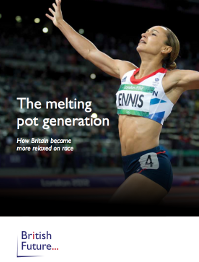“Mongrel nation”: How is the face of Britain seen now?Posted in Articles, Census/Demographics, Media Archive, Social Science, United Kingdom on 2012-12-13 18:43Z by Steven |
“Mongrel nation”: How is the face of Britain seen now?
British Future
2012-12-10
Shamit Saggar, Professor of Political Science
University of Sussex, Brighton, United Kingdom
Twenty years ago Time magazine put a composite photograph on its front cover. It was generated by an IBM 486 computer and fused together the phenotypical features of the world’s six main racial groups. The face that emerged was that of a woman with a striking, yet blended, appearance. The purpose was to sneak preview a mid-twentieth century future in which growing global migration and cross marriage would produce Global Woman, writes Shamit Saggar, professor of political science at the University of Sussex.
Many younger people in Britain today would, if scientifically surveyed, probably acknowledge her beauty. A fair slice would perhaps welcome what she represented. But a distinctive group—a minority, I guess—would be alarmed, sensing that something with value had, or was being, lost…
Read the entire article here.

